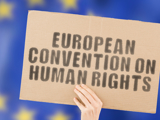What is the difference between the Council of Europe and the European Union from the perspective of rights protections?
This page highlights some of the key differences between the Council of Europe and the European Union from the perspective of rights protections. It is only a summary, and you can find more about the Council of Europe and the European Union on their respective websites.
What is the Council of Europe?
The Council of Europe formed shortly after the Second World War to try and prevent the horrors of the war from reoccurring. The aim of the Council was to protect human rights, and democracy in Europe. One of the most important things that the Council of Europe has done is creating the European Convention of Human Rights (1950), which is enforced by the European Court of Human Rights.
The European Convention of Human Rights and its court applies to every country that has signed up for it. There are currently 46 countries that have signed the European Convention of Human Rights, including the United Kingdom. The European Convention gives human rights protection to everyone in the countries that have signed up for it. This means that, when governments and public bodies interfere with our human rights, we can go to the European Court of Human Rights to put this right.
In 1998 the UK passed the Human Rights Act. This Act takes human rights found in the European Convention of Human Rights and brought them into UK law. This means that whilst people in the UK can still ask the European Court of Human Rights to look at their situation, this is now at the end of the process rather than the start because there are ways to seek accountability for human rights breaches in the UK. Find out more about the Human Rights Act and how it works in our explainer.
What is the European Union?
The European Union, or, the EU, also has its origins in the aftermath of the second world war. It began as a series of different communities called ‘European Communities’. These communities were international organisations that dealt with economics and trade. However, as it grew and more European States joined these communities, it eventually became what we now know as the European Union. The European Union officially formed in 1993.
The Council of Europe and the European Convention of Human Rights are often confused with the European Union; however, they are entirely separate. The European Union is an agreement between states that they will have certain rules and laws made in the EU that they must follow. Some of these EU laws include:
- freedom of movement, which allow EU citizens to live, work and move freely through EU states.
- A law on the maximum working hours, breaks, and annual leave workers can have.
- Laws protecting our personal data and how it is used.
For the EU to create a new law, it must be agreed upon by the European Parliament and the Council of the European Union (not to be confused with the Council of Europe). These bodies are made up of elected officials from different EU member states, this way, each country gets a say in the laws that govern them.
The EU does have its own list of rights that govern everyone living within the EU, this is called the Charter of Fundamental Rights. The Charter of Fundamental Rights does contain the rights found in the European Convention of Human Rights, as well as other rights and laws, however it is separate to the European Convention of Human Rights.
In 2020, following a countrywide vote in 2016, the UK left the European Union (Brexit). This means the UK now no longer must follow the rules set out by the EU, including the rights found in the Charter of Fundamental Rights. It also loses the economic and social benefits of being in the EU, such as freedom of movement.
Does Brexit Affect the European Convention of Human Rights?
One of the big questions surrounding the United Kingdom leaving the European Union is how our rights will be affected. People often confuse the European Convention of Human Rights as being part of the European Union, however this is not the case. Whilst being part of the European Convention of Human Rights is a condition on European Union membership, they are entirely different things.
Many people wondered how leaving the EU would affect our human rights under the European Convention of Human Rights. However, the European Convention of Human Rights is not actually part of the EU, therefore leaving the EU does not affect our rights and protections found in the European Convention of Human Rights.
What's next?
The UK is still part of the European Convention of Human Rights, however, some in the UK government have discussed the possibility of withdrawing from it. For example, in 2022, the European Court of Human Rights prevented the UK government from deporting asylum seekers to Rwanda. This prompted some government ministers to comment on withdrawing the UK from the convention so that it no longer has to follow decisions made by the European Court of Human Rights.
So far there has been no official move to withdraw the UK from the European Convention, but it is being reported in the media and political discussions. Until any official withdrawal, everyone in the UK still is still protected by the European Convention of Human Rights. However, the idea that the UK may withdraw from the Convention is a very real risk.
Withdrawing from the European Convention of Human Rights would be very concerning as it means that everyone in the UK would lose important protections for some of our most fundamental human rights. Whilst our rights would still be protected under the Human Rights Act, withdrawing from the Convention would mean people no longer have access to a court external to the UK to hold our government to account for failing to protect our rights. It could also mean UK courts and the government and public bodies no longer need to follow the decisions of the European Court of Human Rights, which could mean weaker protection of our human rights in the UK.
Related topics
Find out more about UK human rights protections.
Stay up-to-date
Get our newsletter
Get monthly updates on UK human rights law and our work, resources and events sent straight to your inbox.



